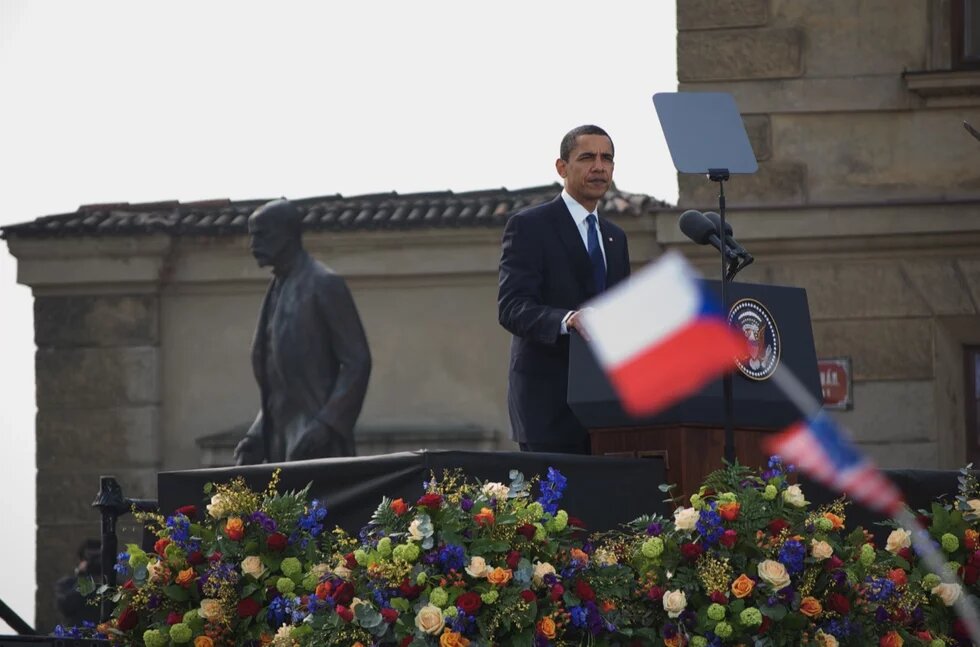
Translation Gwendolyn Albert
Barack Obama visited Prague on 4 and 5 April as part of his first European trip as US president. The visit was transformed into an historical event occurring at a moment that was thoroughly awkward for the Czech Republic: Shortly before Obama’s arrival the Czech government, currently holding the EU presidency, had to resign due to a vote of no confidence. Both Czech PM Mirek Topolánek and Czech President Václav Klaus welcomed Michelle and Barack Obama to Prague.
“The O Moment”
In an effort to capture the historical significance of the visit, the Czech media referred to it as “Day O” or “The O Moment”. The arrival of the US president was anticipated intensely, and Czech Television broadcast and analyzed every detail non-stop.
On 5 April Obama gave a speech which Mirek Topolánek had already called the “European Speech of the Year” some weeks before. The US president could not have hoped for a more idyllic setting: In the courtyard in front of Prague Castle, thousands of mostly young spectators gathered to see him from the early morning hours. As the president gave his speech above the rooftops of Prague, he stood not far from the statue of T. G. Masaryk.
Obama first focused on the historic role of the Czech lands. He mentioned the events of 1968 and 1989 as important milestones on the road to a peaceful, united, free Europe, emphasizing that the Velvet Revolution had taught us all many things, demonstrating that peaceful protest can unsettle the foundation of an empire and reveal the emptiness of its ideology. Even small countries can play key roles in world events. The roar of response that followed this statement showed Obama had won the hearts of his audience.
The future of nuclear weapons in the 21st century
The central theme of the speech was “the future of nuclear weapons in the 21st century.” “Thousands of nuclear weapons are the most dangerous legacy of the Cold War,” Obama said. He stressed that while the danger of nuclear war has been reduced, the risk of nuclear attack has risen, stating that nuclear weapons have been acquired by many countries, nuclear testing is no longer a thing of the past, and the black market in nuclear material is proliferating. Obama also said the USA, as the only world power ever to use a nuclear weapon, has a moral responsibility to take action. A world without nuclear weapons is allegedly possible. The USA will negotiate a new treaty with Russia this year on reducing strategic weapons and the number of warheads in nuclear arsenals.
Ending Cold War thinking
Even though this vision is of the far future, Prague might be just the place to demonstrate that it can be realized. Of course, Obama clarified that the US would maintain its own nuclear arsenal until that day comes. He also spoke about the planned missile defense system in Central Europe. Plans for “financially efficient, tested missile defense” would only be justified should Iran remain a security threat. The president believes in dialogue – in this he differs from his predecessor – and therefore wants to also lead a political dialogue on security with Iran. The question of whether the missile defense system will be located in the Czech lands thus remains open.
Obama mentioned the global economic and climate crises as other important challenges for world societies. When he said the US is ready to take on a leading role in preparing the global energy revolution, he received great applause. Unfortunately, the television cameras did not show the expression on Václav Klaus’s face at that moment – he was most probably not pleased to see that he has neither a political ally nor popular support in this area.
EU member Turkey?
The main topic of the subsequent EU-US summit was the transatlantic alliance and stronger cooperation. Shared values were emphasized, as was the necessity to formulate international responses to global challenges. The leaders of European governments and states also expressed their willingness to support the US in closing the prison at Guantánamo. Moreover, they stressed how important it was to take on a joint leadership role in international climate protection. While the Czech government expressed satisfaction with the results of the summit, some heads of European countries responded critically to Obama’s request that Turkey be allowed to become a member of the European Union.
Obama’s visit to Prague was a pleasant contrast to the sad Czech political drama of recent weeks. The Czech population was able to see with their own eyes that politics can be quite different. We can only hope that something of Obama’s luster and greatness will rub off onto the local political scene. A little bit might do the trick.
Eva van de Rakt directs the Heinrich-Böll-Stiftung office in Prague, Anka Dobslaw works there as program coordinator for energy and climate policy.